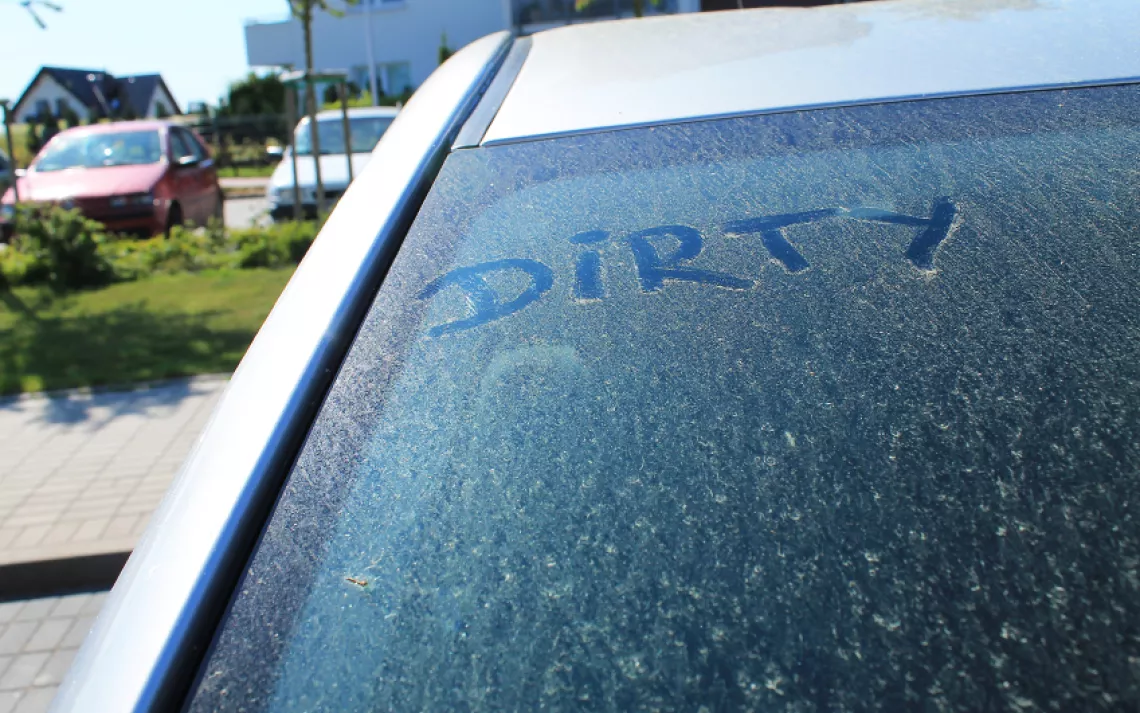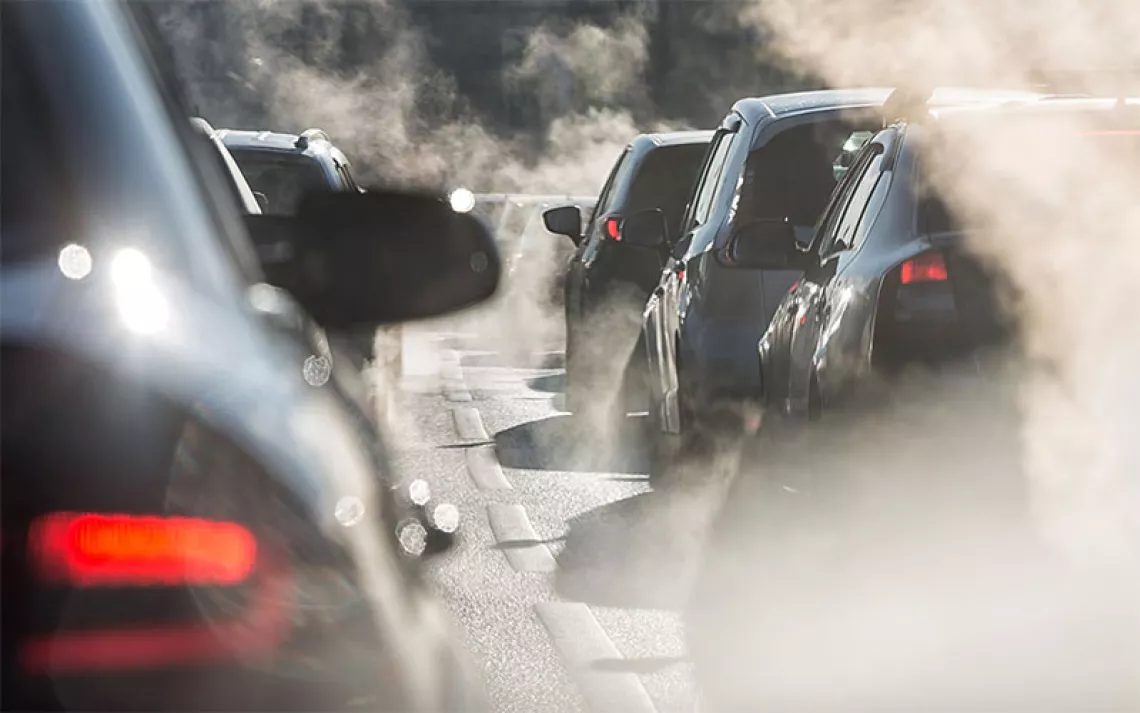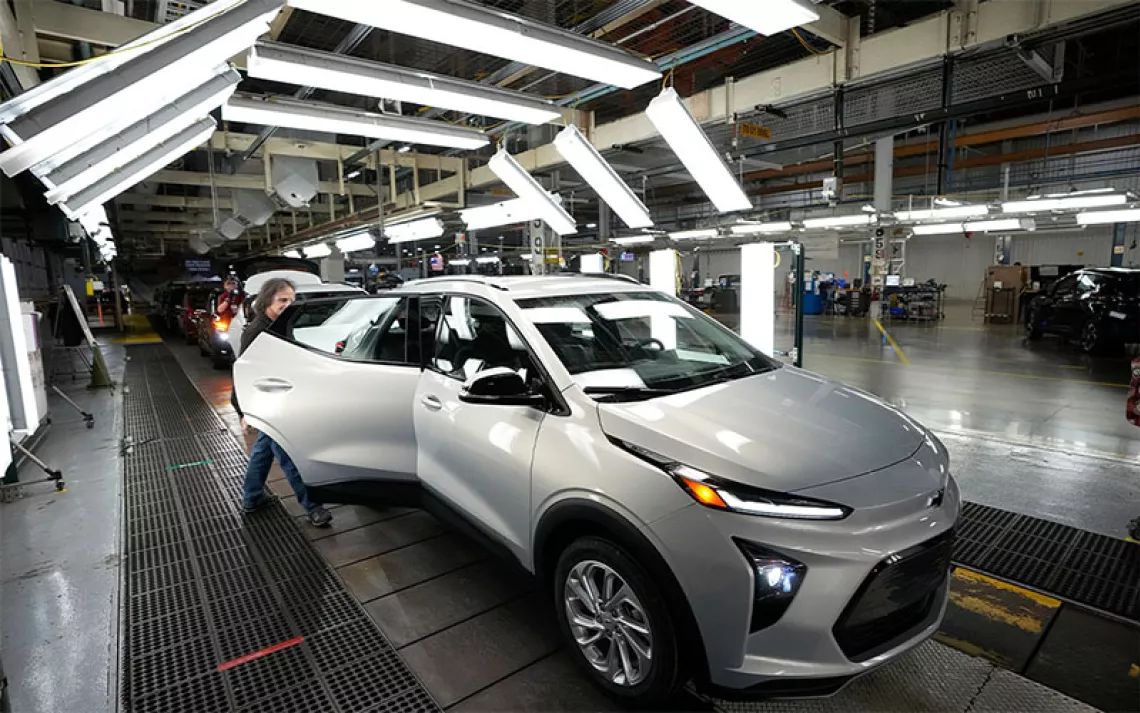Why I’m Suing VW
I thought I was buying a “green car.” What a fraud.

Photo by iStock/Jacek27
As an environmentalist, I probably shouldn’t say this, but I love my car.
For starters, I love its exceptional fuel economy—an average of 37.5 miles per gallon in the four years I’ve owned it and typically up to 45 mpg on the highway, a significant boost above the U.S. vehicle fleet average of 23.6 mpg. I love its understated style—sleek, compact, and modern without looking flashy. I’ve even come to love the feline purr of its diesel engine, the little rumble that signals its latent power.
Unfortunately, my dream car is something of a mirage. That’s because I’m the owner of a 2010 Volkswagen Jetta SportWagen TDI, one of the nearly half a million VWs that, as the company now admits, was secretly manipulated to evade U.S. and California clean air regulations. VW sold me, and hundreds of thousands of other Americans, a vehicle whose green promises (“clean diesel!”) were little more than a smoke screen.
Let’s be real: Owning a car is a regrettable necessity in our sprawling, industrial landscape. I’m lucky enough to live in a region—the San Francisco Bay Area—where I don’t have to drive much. I commute by bike and train, and I can get everything I need within walking distance of my home. Most weeks, my car sits curbside gathering dust and leaves. But on the weekends, my family and I like to get away to the seashore, the forests, or the mountains—and for that we need a car.
When our old car got totaled in December 2011, my partner and I had to make the tough decision of which car to buy. Given our shared commitment to protecting the environment, the Toyota Prius was a natural choice because of its superb fuel economy. (At that time, the new generation of electric vehicles such as the Chevy Volt, Nissan Leaf, Fiat 500e, and various Tesla models weren’t yet in mass production.) But my lady couldn’t stand the Prius. She didn’t like feeling, as she put it then, like she was “driving a computer.” And, more importantly, she found the visibility to be poor. She didn’t feel safe driving it.
For me, though, best-in-class fuel economy was non-negotiable. So that made the line of (supposedly) clean diesels the next best option. Due to their higher compression ratios and more intense internal combustion, diesel engines are, on average, about 30 percent more efficient than gasoline engines at burning petroleum. But there’s a hitch. Because a diesel engine burns petroleum at a hotter temperature, it turns more nitrogen into nitrogen oxides (or NOx). Such NOx are a main ingredient in ground-level smog, the kind of air pollution that is bad for plants and people and, with persistent exposure, contributes to lung disease and other respiratory ailments that can cause an early death.
Diesel engines’ contribution to smog meant that, for decades, American regulators frowned on diesel technology, even as European governments embraced the engines, mostly because of their superior fuel economy. Then, in the mid-2000s, the major automakers—led by German firms VW and Audi—said they had developed new “clean diesel” technology that would meet the stricter U.S. air quality standards while also delivering high fuel economy and road power. Though some people (like my Sierra colleague Reed McManus) remained suspicious of the big claims, I’ll admit that I fell for them. It seemed we could have our nifty vehicles and our clean air, too. (To be sure, I wasn’t alone in falling for this mirage. The Sierra Club, under previous executive director Carl Pope, endorsed the new line of “clean diesels.”)
As we now know, it was all a scam. Engineers in Germany had programmed the software in their diesel engines to recognize when the vehicles were undergoing a smog check. The NOx-controlling technology only switched on when the engine knew that it was experiencing a set of demands unique to testing conditions. Most of the time—under normal road conditions—the cars emit up to 40 times the allowed amount of NOx.
Being committed environmentalists, my partner and I bought our VW Jetta precisely because we believed that it was an exemplary “green car”—insofar as such a thing isn’t a contradiction in terms. We were defrauded. And now we’re pissed off. Although we both dislike the litigious culture here in the United States, we have decided that we will join one of the class action lawsuits being prepared against Volkswagen.
At first glance, the VW scandal appears to be one more example of corporate chicanery. The fraud is in line with the Enron and WorldCom meltdowns and the Lehman Brothers bankruptcy. In all these cases, a company’s carefully crafted public image disguised secrets within. But there’s a lesson here that’s bigger than simply “don’t trust big business,” and it has to do with the all but inevitable trade-offs of achieving environmental sustainability.
According to some number-crunching by the Associated Press, between 5 and 20 people in the United States have died annually due to the extra smog and soot pollution from VW’s noncompliant vehicles. Smog is a real killer. At the same time, global climate change is a real killer, too. The World Health Organization estimates that up to 150,000 deaths a year already may be attributable to global warming and its associated droughts, floods, and disease transmission. So while a standard diesel engine’s increased NOx emissions have an obvious environmental cost, its better fuel economy and lower CO2 emissions have an obvious environmental benefit. For environmentalists, it’s something of a “Sophie’s choice”: Do we want clean, smog-free air at the local and regional level, or lower greenhouse gas emissions at the global level?
I loved you until I found out you were a cheat. | Photo courtesy of Jason Mark
There’s no technological reason why we can’t have both. As Don Hillebrand, the former president of the Society of Automotive Engineers, told Live Science, “You have power, you have energy, you have emissions: You get to choose two of them.” In this case, VW chose to keep power and fuel economy and sacrificed clean air. But another option was available: Sacrifice road power. Sure, I guess I would miss the sport mode on my VW, but I’d rather have smog-free skies than a car with a lot of pep.
Yet another approach has been pioneered by Mercedes-Benz. Its diesel vehicles inject urea into the NOx emissions, transforming them into less harmful substances. According to Live Science, “This approach doesn’t compromise on fuel economy or power, but it requires a separate tank for the urea, which must be periodically refilled.” Which makes the system more expensive and sets up one more trade-off: cost. Diesel engines can have low NOx emissions and maintain high fuel economy—but not while staying affordable to the average car buyer. VW’s bigger, pricier six-cylinder vehicles include urea systems. The company chose to skip them for its four-cylinder vehicles in order to sell more units—and make more money.
Taken altogether, the VW con offers a cautionary tale for environmentalists. It’s a reminder that nearly every environmental advance comes with some sort of drawback. Zero-carbon wind turbines sometimes kill birds; state-of-the-art solar panels are manufactured from nasty chemicals and silica that has to be mined from somewhere. The early adoption of any new green technology will be costly, and somebody will have to bear that cost.
Which doesn’t mean the work isn’t worth doing. Only that if it sounds too good to be true, it probably is. And that the burden is on us, as an environmental movement, to ask the tough questions that will foil cheaters like Volkswagen.
 The Magazine of The Sierra Club
The Magazine of The Sierra Club







